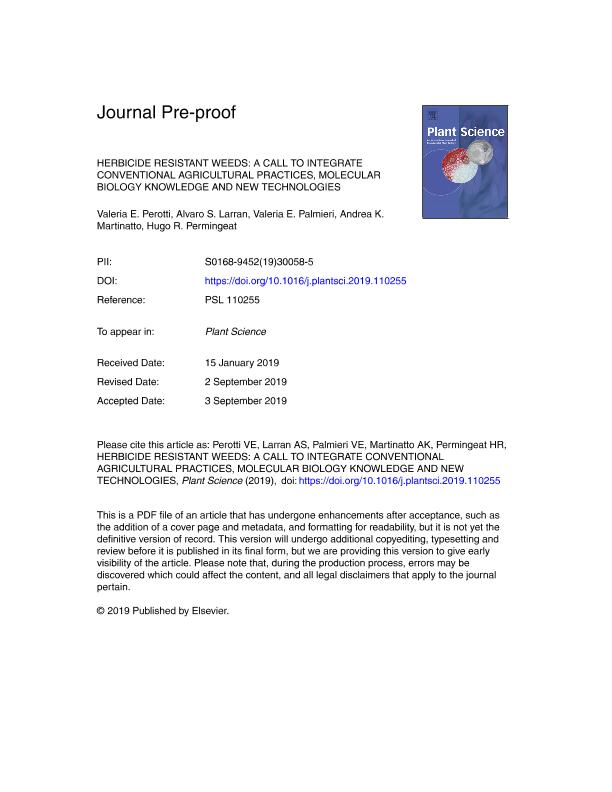Artículo
Herbicide resistant weeds: A call to integrate conventional agricultural practices, molecular biology knowledge and new technologies
Perotti, Valeria Elisa ; Larran, Alvaro Santiago
; Larran, Alvaro Santiago ; Palmieri, Valeria Esther
; Palmieri, Valeria Esther ; Martinatto, Andrea Karina
; Martinatto, Andrea Karina ; Permingeat, Hugo Raúl
; Permingeat, Hugo Raúl
 ; Larran, Alvaro Santiago
; Larran, Alvaro Santiago ; Palmieri, Valeria Esther
; Palmieri, Valeria Esther ; Martinatto, Andrea Karina
; Martinatto, Andrea Karina ; Permingeat, Hugo Raúl
; Permingeat, Hugo Raúl
Fecha de publicación:
09/2019
Editorial:
Elsevier Ireland
Revista:
Plant Science
ISSN:
0168-9452
Idioma:
Inglés
Tipo de recurso:
Artículo publicado
Clasificación temática:
Resumen
Herbicide resistant (HR) weeds are of major concern in modern agriculture. This situation is exacerbated by the massive adoption of herbicide-based technologies along with the overuse of a few active ingredients to control weeds over vast areas year after year. Also, many other anthropological, biological, and environmental factors have defined a higher rate of herbicide resistance evolution in numerous weed species around the world. This review focuses on two central points: 1) how these factors have affected the resistance evolution process; and 2) which cultural practices and new approaches would help to achieve an effective integrated weed management. We claim that global climate change is an unnoticed factor that may be acting on the selection of HR weeds, especially those evolving into non-target-site resistance mechanisms. And we present several new tools –such as Gene Drive and RNAi technologies- that may be adopted to cope with herbicide resistance spread, as well as discuss their potential application at field level. This is the first review that integrates agronomic and molecular knowledge of herbicide resistance. It covers not only the genetic basis of the most relevant resistance mechanisms but also the strengths and weaknesses of traditional and forthcoming agricultural practices.
Archivos asociados
Licencia
Identificadores
Colecciones
Articulos(IBR)
Articulos de INST.DE BIOLOGIA MOLECULAR Y CELULAR DE ROSARIO
Articulos de INST.DE BIOLOGIA MOLECULAR Y CELULAR DE ROSARIO
Citación
Perotti, Valeria Elisa; Larran, Alvaro Santiago; Palmieri, Valeria Esther; Martinatto, Andrea Karina; Permingeat, Hugo Raúl; Herbicide resistant weeds: A call to integrate conventional agricultural practices, molecular biology knowledge and new technologies; Elsevier Ireland; Plant Science; 290; 110255; 9-2019; 1-66
Compartir
Altmétricas



